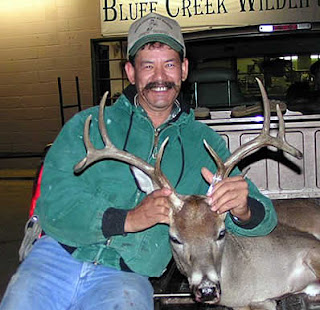
This here is a copy of the paper I presented at the Experience Music Project in Seattle, Washington this past weekend.
"Is Anybody Going to San Antone?"
Doug Sahm, the Sir Douglas Quintet, and Memories of Home
Howdy, my name is Andy Beta and I'm a freelance writer living in Brooklyn, New York. My paper concerns a sixties pop song that evokes my hometown of San Antonio, Texas. I haven’t lived there in well over a decade, yet the city is never far from my mind.
Take for instance my neighborhood bar, a watering hole called Daddy’s, but a few doors down from me in Brooklyn. This place evokes the Texas I always remember. Mounted deer heads and horseshoes hang from the rustic wood walls, reminding me of them old ranch houses that you might find up in the Hill Country of South Texas. And yet, there’s few bars in Texas that pretend to be a ranch house. Instead, they hang knots of neon beer signs and banks of TVs, their light glistening off the dark polished wood. Patrons mingle about giant cardboard cutouts of NASCAR racers or big-titted bikini models peddling Coors Light.
One night, I walked into Daddy’s and heard a song I probably hadn’t heard in close to ten years. “The Sir Douglas Quintet is back,” a familiar southern drawl announces, thanking their fans and “all the beautiful vibrations.” “Mendocino” was spinning overhead, by a band also hailing from my hometown, the Sir Douglas Quintet. It’s a song wherein the frontman of the group, a fellow named Douglas Wayne Sahm sings about teenyboppers that blow his mind, going so far as to liken one to a “groove.” Who calls someone a “groove”? It was the band’s second national hit.
It wasn’t the first taste of fame for Sahm though. Born to German and Irish immigrant parents in San Antonio, he was a prodigy on fiddle, mandolin, and steel guitar. At the age of five, Doug began playing honky-tonks backing touring country acts. He even played behind ol’ Hank Williams but two weeks before he died in the backseat of a car. As a ‘tween, he could walk across a neighboring field to a club and check out T-Bone Walker, Bobby “Blue” Bland, or James Brown on any given night. But his momma made him turn down the Grand Ole Opry so that he could attend high school in San Antonio.
Doug Sahm cut honky tonk and R&B in his teens, trying in vain to convince a local producer named Heuy P. Meaux to record him. Appropriately dubbed “The Crazy Cajun,” Meaux had a string of local hits and couldn’t be bothered. It was only when Beatlemania descended like locusts across America’s musical landscape, wiping out all that came before, that Meaux (after holing up in a hotel room with every Beatles single he could find and a couple bottles of Thunderbird wine) decided to clad Sahm and a few other boys from San Antone in British suits ‘n’ boots, and call ‘em Sir Douglas Quintet, so that these vatos might pass for limeys.
The Sir Douglas Quintet’s first hit came in 1965, a greasy and quintessential cut of garage rock called “She’s About a Mover.” A melding of the Beatles’s “She’s a Woman” and Ray Charles’s “What I Say” onto a Cajun two-step beat, the music as rendered by Sir Douglas Quintet is pure Texas: rattlesnake hip-shake, ballpark organ blat, Huevos Rancheros with refried beans, a sound as blue and smoky as a broke-down jalopy.
With a Top 20 single to their name, Sir Douglas Quintet gigged Hullabaloo and Shindig, saw the world, wound up out west to make it with sweet things that “blow your mind every morning,” as their follow-up hit, “Mendocino,” states. And yet for all that globetrotting and evocation of California sun, “Mendocino” remains the epochal South Texas single. In under three minutes, it blends garage-rock with soul, country & western with cojunto, blues with oompah bands, with every ethnic culture of South Texas present: white, black, brown, red.
It dawns on me that in nearly 40 years, there hasn’t been a more-enduring band to hail from San Antonio than the Sir Douglas Quintet. And there’s no greater native son than Sahm. Who else could get Bob Dylan to be in his backing band? Ask Elvis Costello, who stole both Sahm’s singing style and that needling organ tone for his own band. Sure, there’s the Butthole Surfers, but folks in San Francisco, Austin, and Athens can lay (partial) claim to them. And the lead singer from that faux-grunge band Candlebox, he was from SA, but he doesn’t count.
Is that why I knew “Mendocino” all these years, as a matter of hometown pride? That’s why my best friend from high school and I played his copy of Mendocino to death. That whole album became second nature to us: we’d take a break from making music (okay, making noise), draw on some Mexi-dirt, crack a cold one, and we’d spin that sucker all night long, relishing with pride when that one number came on, near the end of side one. “At the Crossroads,” it was, where Doug Sahm belts out: “But you just can’t live in Texas, if you don’t have a lot of soul.”
Slouched on my bar stool in Brooklyn, I catch myself singing that line now. I no longer live in Texas though. In fact, I don’t even own the record. My best friend did. And even though we still sometimes bump each other on the streets of Brooklyn, we don’t speak anymore. We’ve grown apart, things changed, we’re not the same people anymore. And yet as “Mendocino” plays on, I’m right back in his living room, the air still hazy with smoke. Maybe I didn’t have enough soul. Maybe neither one of us had enough soul, and that’s why we’re no longer in our hometown, but thousands of miles away.
But when Doug sang those lines back in 1969, he wasn’t in Texas neither. After touring through Europe in ‘65, Sahm got busted in the Corpus Christi airport with some grass and --Texas laws being draconian (just ask Roky Erickson, who opted for a mental asylum rather than do jail time)-- was soon exiled. He went thousands of miles away too, to sing about Mendocino, a little coastal enclave north of San Francisco, off the Pacific Coast Highway. The album itself was recorded at Columbus Recording in San Francisco and in North Hollywood.
And yet he never stopped thinking about Texas. In an article from Texas Monthly in 1974, author Gregory Curtis details a friend who has also left Texas, yet cannot escape its pull. “You can’t just leave Texas the way you can just leave Idaho,” the friend slurs one night, the latest Doug Sahm platter cranked up on the stereo. He turns to drunkenly address it: “I don’t need goddamn Doug Sahm to tell me about leaving Texas,” he said, “but he sure as hell knows what it’s like.”
He sure as hell does. There’s a palpable sense of estrangement and mal du pays throughout that album. One song has the title: “Lawd, I’m just a country boy in this great big freaky city.” And in much the same way that he took what the Beatles and Ray Charles had recorded as the basis for his first hit single, so too does he co-opt Otis Redding to fit his own situation:
I left home in Texas, headed for the Frisco BayHere he is, smack-dab in the middle of hippie paradise, overlooking the Pacific Ocean, yet he misses dives like Farmer’s Poolhall on the east side of SA and redneck backwaters like Port Arthur. Severed from his roots, he begins to question just who he is. As his surroundings have changed, so has his interior landscape. “I have always snapped that environment shows in music,” Doug stated on the liner notes for one of his records. Things aren’t the same out there, and neither is he. It saddens him to realize that, despite how desperately he wants to hang onto that “Texas me,” inevitably he can’t.
Encountered a lot of hard times, through changes all the way.
Now I'm up in Sausalito wondering where I ought to be.
And I wonder what happened to the man inside,
the real old Texas Me.
And yet he always dreams of a change that will revert time back, a return to how things used to be. And then I glean something else in “Mendocino.” Sure, it is outwardly about a barely-legal chick, but there’s also an undertow to it too, a desperate prayer beneath its come-on: “Stay here with me,” Doug Sahm pleads. “Please don’t go.” It’s this futile fight for a paradise lost, a past now made untenable.
It’s what I want to tell my old friend when I pass him on the street, when I run into him in Brooklyn, so far from our hometown. I too want to believe in Doug Sahm’s plea at the end of “At the Crossroads”: “Some day a change will come and you will be beside me one more time.” I want those intervening years to disappear, the distance between here and ‘home’ to be eradicated, to be back in that little room of San Antone, where we’d play music and spin them old records, oblivious to the paradise of that time together. I want to just hear “all the beautiful vibrations,” Augie Meyer’s incessant, asthmatic Vox organ, and that eternal bit of sunny Tex-Mex pop, “Mendocino.”
And then it hits me, right there on my barstool in Brooklyn, why I always felt that I knew this song. It wasn’t because my best friend and I learned of it ourselves. It wasn’t on oldies radio when I was growing up. The reason I knew “Mendocino” was because my father used to sing it to me! That’s how I knew it! He’s the one that grew up on it, he’s the one that heard it blaring out over the radio in the summer of ’69.
My father always talked about that song. That’s why, when I was thumbing through my best friend’s record collection, I picked it out. Because I had never heard it before. My father would reminisce to me about his own time back in high school, when he and his best friend, a fellow named Leonard, would deerhunt, do farm chores, drive tractors, all the while the radio was cranked up to resound across the plowed fields. To hear him describe it, that was the greatest summer of his life, that summer of 1969 when “Mendocino” dominated the airwaves in South Texas. That was their song, he would recall. And yet I never had that testimony corroborated by Leonard himself. In fact, I never even met his best friend, as they hadn’t been on speaking terms my entire life.
It’s come full circle: a poppy Tex-Mex 45 about teenyboppers, the quintessential South Texas single, a tune that has soundtracked two generations of friendships, also hints at the shifting sands of paradise, an ebullient pop song that reveals that all things come to an end. No matter how many times Sahm pleas “I love you so, please don’t go,” however many times my father evoked that magical summer, or however many times I hear it in my head now, there’s no holding onto people. They don’t stay put in Mendocino, they don’t remain “in a love house by the river,” they don’t remain in San Antone or wherever home may be.
And I want to talk to my father about this now, but we no longer speak ourselves and haven’t for a good number of years. Thousands of miles from home, the song from my hometown long since replaced in that jukebox, I just shake my head to think that this all transpired in my mind for the duration of a side of a 45, at a bar called Daddy’s.





